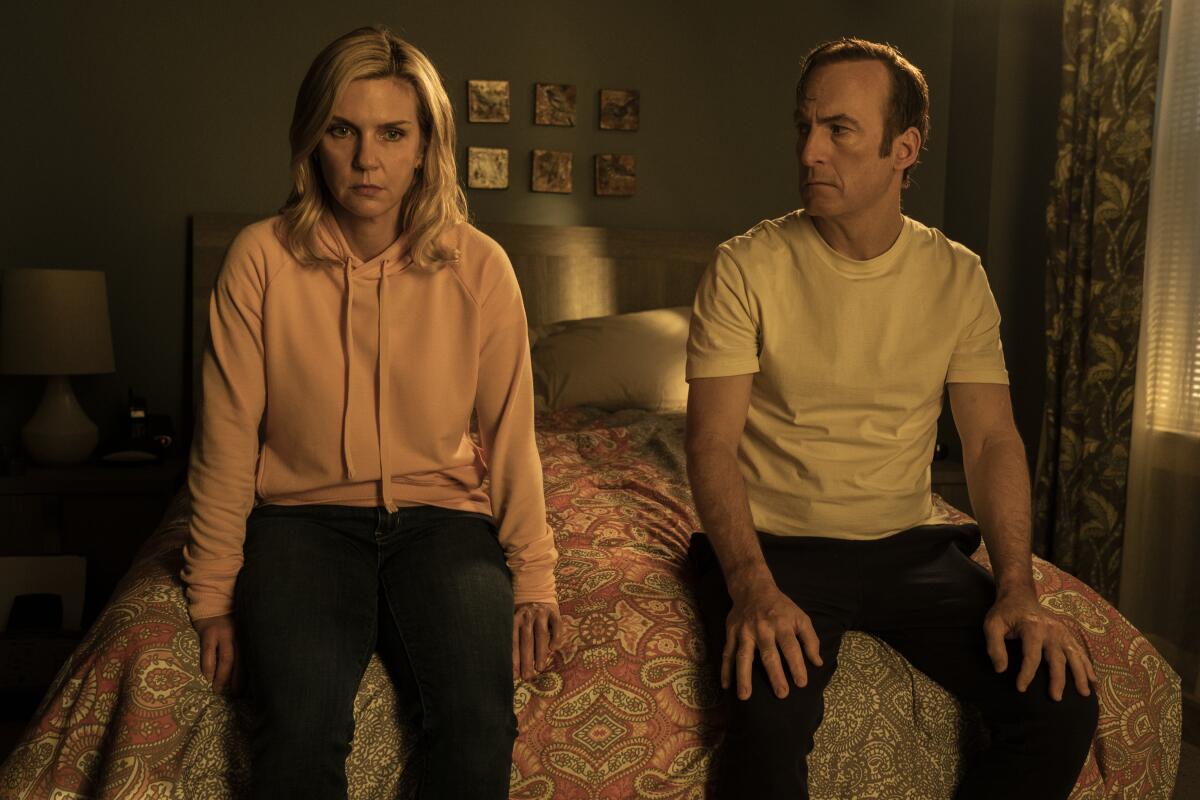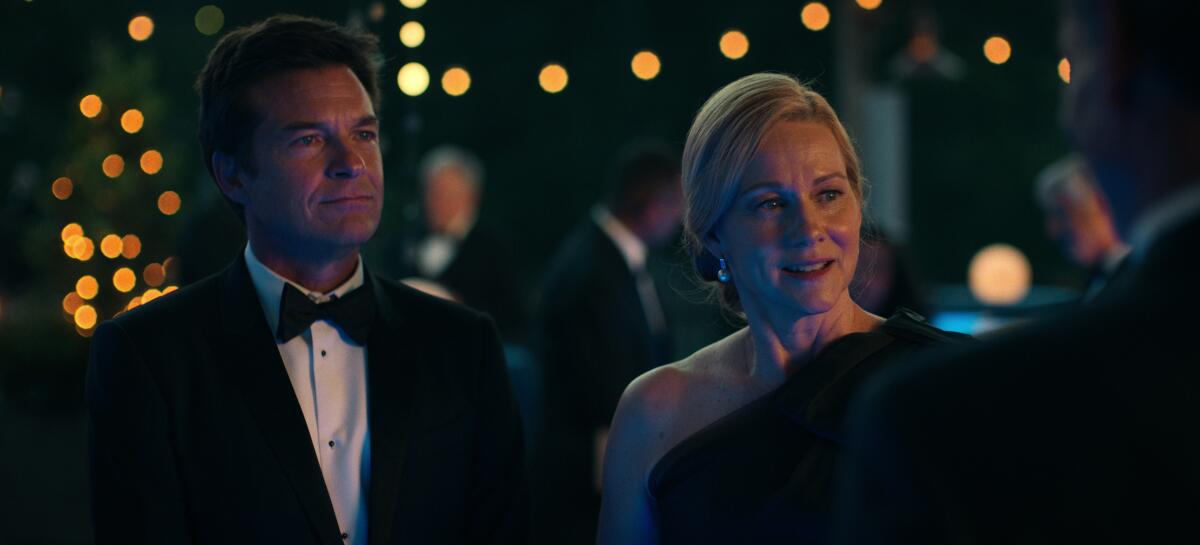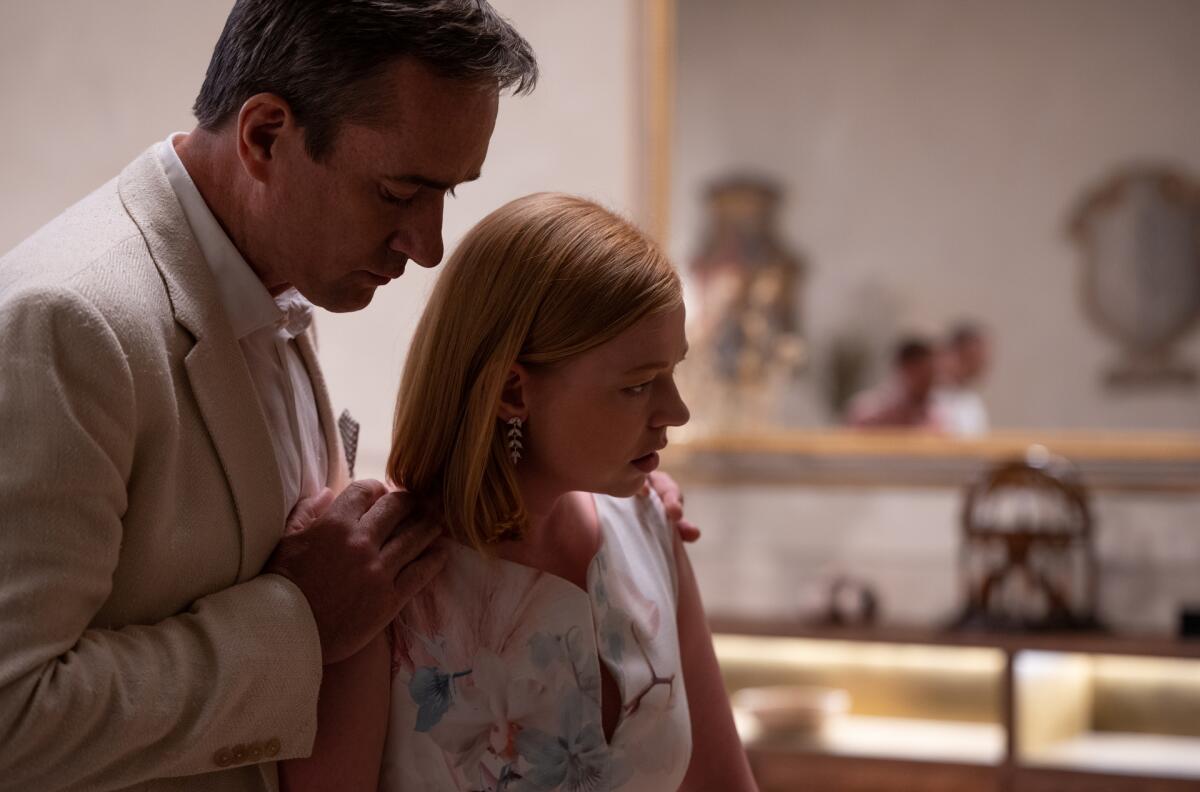A couple that schemes together, dreams together

- Share via
Not to place undue blame on the showrunners of television’s most popular shows for what statistics tell us is a steady decline in the nation’s rate of marriage, but it would seem conjugal harmony just isn’t considered ... bingeworthy. When “Ozark’’s” Marty Byrde tells wife Wendy in his reliably matter-of-fact way, “The sound of your lover smacking the pavement is the only thing that gets me to sleep every night,” we’re looking at a deep brand of marital bitterness.
Yet there is a still deeper bond that keeps this unhappy couple — and other fictive pairs much like them — together. For Wendy and Marty it is survival turned to clawing for power; for “Succession’s” Shiv and Tom, it’s boardroom clout mixed with insatiable greed — until one of them has had enough; and for “Better Call Saul’s” Jimmy and Kim, it’s revenge tinged with a dark prankster spirit — until things get too out of hand. And in a new twist (ora very old one if you consider Shakespeare’s “Macbeth”), it’s the wife in each of these series who pushes her spouse to ever more dastardly deeds.
A considerable story-sparking boon that “Saul’s” co-creators Peter Gould and Vince Gilligan hadn’t foreseen came with the shudder-inducing descent of Rhea Seehorn’s Kim Wexler (known to punctilious if deadly gangster Lalo Salamanca as “Mrs. Goodman”), in her race to the ethical bottom with Jimmy.
“When we started the show,” says Gould, “we didn’t have a clear idea of where we were going with the Kim character. In the pilot, she has maybe three lines of dialogue. We were feeling our way through it with Rhea, and as we got to know Jimmy better, we started understanding how central she was going to be to his journey. It turns out that Kim has a wild side. ”
In the series’ jolting fifth-from-final episode, “Fun and Games,” we saw one last canny stroke from Kim, gaslighting the teary wife of a murdered series fixture, and then her leave-taking confession to Jimmy when she realizes they egg each other on to ever more despicable actions. “The difference between them,” says Gould, “is that Jimmy cuts corners because that’s just the way he sees life — to get something that he wants. Kim has such a sense of outrage and injustice that when she cuts corners, even with her bad actions, it’s often because she wants to resolve all that. Part of the brilliance of Rhea Seehorn is that there’s a paradox at the heart of her performance.
“The thing that I love about Kim is that she’s unstoppable,” adds Gould. “She has such focus, so much get up and go, so much ability to pick herself up after getting knocked down.” But remorse finally arrives: “The idea that a romantic couple is an island unto themselves, that it doesn’t really matter what happens outside your relationship or outside your family — that’s a very flawed logic.” Ultimately, “Kim sees that no matter how much she and Jimmy are enjoying each other and enjoying their life together, they’re wrecking everybody around them. They’ve done terrible things, with terrible effects. And there’s no way to make up for those things.”

When “Ozark” showrunner Chris Mundy and colleagues set out to create a series that emerged as part thriller, part excavation as to just how capitalism can go awry in flyover country, they — like the “Better Call Saul” creators — were open to seeing where casting might take them. Laura Linney’s Wendy was “a character that wasn’t built yet,” but Linney’s early work, in which her theater training played a part, showed “she could do anything you gave her,“ Mundy says. What they gave her was a scheming, upwardly mobile criminal who pushed her husband to go bigger and deeper with the cartel.
Also, by contrast to many series that leave their actors somewhat in the dark about the overall plot, “She and I would sit at the beginning of every year and check in as the season went on, and she would make choices based on knowing what was going to happen — choices that were always right,” he says.
Mundy recalls a moment in the first season when one of the FBI agents who has been following the Byrdes’ trail since their messy exit from Chicago (and the lover’s body slamming to the pavement) through the money-laundering, cartel-ducking chapters in the Ozarks, confronts the pair outside their home. Linney’s nascently criminal wife exudes baffled innocence: “And there’s that little thing, she locks arms with Marty a little bit.” By six episodes later, “The same FBI agent comes to her at the realty office and is putting pressure on her and she goes full mob boss: ‘If we really are who you think we are, then you do not want to be threatening us like this.’”

“Succession’s” recent season brought new twists to the endlessly shifting allegiances of the Roy family; if Sarah Snook’s Shiv has been weathering many of the recent plotline’ s psychic punches, she’s not shy about delivering some herself, whether to spouse Tom (Matthew Macfadyen) — she tells him with a cruel smirk, “I don’t love you” — or to her feuding siblings. The couple’s schemes to get Shiv put in charge of the family’s mega-corporation, Waystar Royco, looked surpassingly nefarious and twisted until patriarch Logan Roy and the doubly conniving Tom began their own maneuvers to unwind it.
According to Lucy Prebble, the award-winning playwright who is an executive producer in showrunner Jesse Armstrong’s writers’ room: “We leave Shiv in a particularly weakened state. There are betrayals she expects — expecting betrayal is a great defense mechanism. But this one wasn’t on the list. And perhaps Tom was a romantic choice who was supposed to protect against that.”
In retrospect, adds Prebble, “It makes you understand why she had developed the strategies she had [in earlier seasons]. She has been undermined and weakened by changing that tack. Shiv’s interest is power, and although there are ways to marry in pursuit of that, Shiv starts from a position of not needing that. She is already a queen. She chose [having] power within her marriage rather than seeking a marriage to gain her power.”
All three dramas showed us rage and chicanery in abundance, with just enough fidelity glinting through their stories to allow some humanity. Ultimately, if “Ozark” showed an often dysfunctional family, it also found its way (to some viewers’ skepticism) to ultimately embracing what Marty termed “love ... with a lot of conditions,” not just in that pressurized marriage but encompassing the sporadic rebelliousness of their son and daughter.
“Because the cast was so good, all around the horn, it allowed us to write the show with situations that are slightly elevated, knowing that people are going to act way more tethered to the ground,” Mundy says. “You can be 10% more operatic than you would if somebody was going to play it too high. Everybody being so good gave us a ton of freedom — the evil things could be just a little more evil.”
More to Read
Sign up for The Envelope
Get exclusive awards season news, in-depth interviews and columnist Glenn Whipp’s must-read analysis straight to your inbox.
You may occasionally receive promotional content from the Los Angeles Times.






